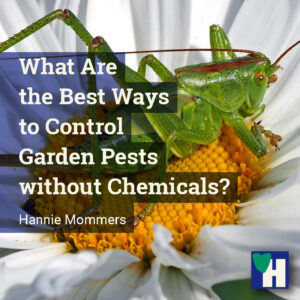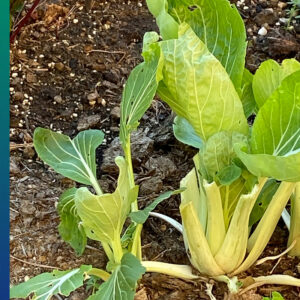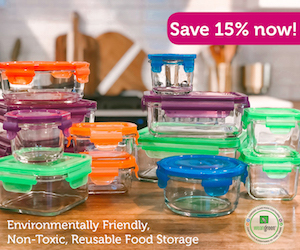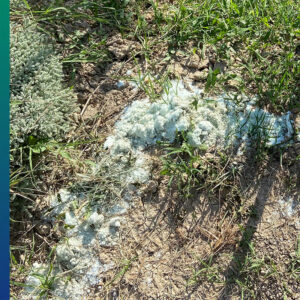
It’s December at the moment and back in the Netherlands, I would never have to worry about pest control at this time. But over here in Spain, my second crop is in the kitchen garden. And the grasshoppers have a field day on my plants.
Whenever possible I try to avoid killing insects. I prefer them to move over to the woods behind our house or to the campo (the Spanish countryside). But I also want to eat my harvest so if they are very persistent, I take bigger measures.
What are the best ways to control garden pests without using chemicals or artificial toxins? I have listed 10 methods in this article.
Some of the links are affiliate links. As an affiliate associate, we earn a commission when you purchase any of the products offered through the shared links at no extra cost for you. This helps us maintain this website.
Table of contents
The best ways to control garden pests
Biodiversity is very important so the best way to control garden pests is to make sure they don’t like our plants or to withhold them somehow to enter the garden.
Control through precautions

We don’t have to immediately use a natural pesticide to keep our garden pest-free. We can prevent a lot of misery by a thoughtful way of organizing the vegetable garden.
Keep compost bin and garden waste at some distance
A compost pile or dead hedge attracts lots of insects. This is good because we want the scraps to turn into fertile earth quickly and as green gardeners, we surely want to support biodiversity.
Yet we don’t want all of those insects on our crop as well. By keeping the compost bin and the garden waste at some distance from the kitchen garden, we keep at least part of the insects away from our plants.
Related: How to Attract Insects to our Garden and Support Biodiversity?
Crop rotation
Crop rotation means that crops change places every season. It ensures that different nutrients are withdrawn from the soil and thus prevents the need for excessive fertilization.
A rotation schedule of 3 or 4 years is often used, whereby the soil can settle in the last year without planting.
Crop rotation not only keeps the soil healthy but also ensures that there is less increase of unwanted insects.
Related: Negative Neighbors: Which Plants Should NOT be Planted together?
Companion planting
By placing the right plants next to each other, we not only promote their growth, but it is also possible to keep hostile insects away.
Related: Organic Companion Planting for a Healthy Kitchen Garden
Be present

A vegetable garden close to home is easier to visit on a daily basis than one that is further away.
By frequently visiting our garden, we notice possible problems earlier. The sooner we can take measures, the easier it is and usually the smaller the impact on nature.
Nets and gauze
If insects, birds and other small animals cannot get to our plants, they cannot damage or rob them.
Nets or metal mesh can be placed around the plants. Row covers also keep most insects out and immediately provide protection against storms and wind.
The use of plastic is terrible in regular agriculture. Price, availability, and unawareness are the basis of this. For our small vegetable garden, fabric row covers are affordable and better, because fabric can breathe and has no condensation on the inside.
Natural pesticides

The most difficult part of pest control is identifying the problem. Especially if the pest is in the ground, such as earth beetles and worms that eat the roots of a plant.
The internet and all sorts of gardening apps can help with the identification process.
Some of the solutions discussed here kill the insects. I always try to avoid that as long as possible, for example by using methods that scare the insects away.
Spraying
Water can wash away the smaller insects with a sturdy plant sprayer.
If that doesn’t help, the next step may be soapy water. Mix 1 to 2 tablespoons of organic dishwashing liquid or liquid soap with 1 litre of water. Add a few drops of lemon essential oil. This mixture helps against mites, whiteflies, mealybugs, aphids and thrips.

I scare off the grasshoppers with the following mixture:
- 1 litre of hot water;
- 5 cloves of unpeeled crushed garlic;
- 1 tablespoon of organic dish soap;
- 1 tablespoon chili powder.
After steeping overnight, I pour the mixture through a sieve and spray the plants twice with a week in between. The mixture cannot be left too long as the garlic and chili powder will rot.
Oh, and it should also help against beetles and slugs.
Related: 8 Natural Pesticides for Plants that are Useful in our Garden
Using our hands
Insect eggs can be scraped off the leaves by hand or with gardening gloves on.

At times it is also sufficient to carefully catch insects in our hands and release them elsewhere. Unless there are too many.
Then we can try to solve the problem by holding a pot of soapy water under the leaves and shaking off the insects.
Dustbuster
I have not tried this myself, but some people use a small dustbuster to get insects off the plants.
Non-toxic sticky traps
Honey, vaseline, resin, or a non-drying glue like Tanglewood on any yellow object will catch flying insects. The disadvantage is this can catch insects you don’t want to destroy, so use the sticky traps carefully.
Whitening trees and borders

Here in Spain I often see trees that are partially painted white or squares around a vegetable garden that are white. This is also intended to repel insects, although the substances used are different.
Whitewash is painted on the lower part of the tree and consists of loam or bentonite, seaweed lime and water. This stops insects and ants.
The white of the borders consists of iron sulphate, against the snails. Incidentally, that does not seem to work in a wet climate and it is better to use iron chelate. Both are for sale at the ecological garden centres.
Controlling garden pests
I am sure there are more ways to control garden pests without using toxic pesticides. What I have described here are the things I have experienced myself or know from befriended gardeners.
Do you know other non-toxic garden pest control methods? Tell us in the comment box below.


I am intrigued by the mixture you use against the grasshoppers… does your lettuce and cabbage have a spicy garlic taste after this treatment? Not that I would mind, I like all the spices and would wash away the soap 😉
I don’t have any extra tips for you, because I currently only have a tiny balcony. But the minute I have a (vegetable) garden, I will return, for these tips!
I wish, but no, it doesn’t taste like garlic and chili. The time between spraying and eating is too long, so it gets washed off by the rain, vanishes in the air in time, or gets washed off when the vegetables are cleaned.
You could have some pots with herbs on your balcony if it’s not too windy? I have several pots, both inside and outside the house. It looks so cosy, I think. And it is also useful in winter for some herbs so they do not freeze.
Thanks for your comment, Klaartje, and take care.
Thankyou for ALL your Information.
I am NOT a Green Finger.
This gives me an Idea into what i can Hope to Achieve.
Should I Decide to Care for a Garden
Hi Rique,
Thank you for your comment. Sorry to read that you’re not a green finger. This is of course always a challenge. So I understand.
The advantages are numerous. With green fingers, You can feed yourself. Be outside as often as possible. Enjoy the sun and good company.
So I sincerely hope that soon you will get a garden to care for. And green fingers of course.
Regards,
Tom
I have a huge problem with grasshoppers here every summer … They eat everything … I have used crushed tobacco to keep them away and I also tried with cinnamon, but it has just a temporary effect. I will try the mixture you shared in this article. With the garlic and chilli that should do it. It takes a bit of preparation, but if it works, then I guess it’s worth it.
I also don’t kill any of those insects that are considered pests. I try to use natural pesticides to keep them away. Sometimes I also grab them and carry them off, put them on a weed where they are allowed to chew 😉 it works sometimes 😉
For example, there is this type of beetle that loves to eat my nopal plant (it’s an edible cactus in Mexico), so I spray it with some natural repellent but I also remove the beetles and carry them over to another succulent that grows wildly and is not edible. The beetle didn’t return to my nopal.
I can imagine your problem with grasshoppers is as big as ours, Christine. Or maybe even bigger! So far, my mixture works very well but indeed I have to spray several times and also after heavy rains when everything is washed away.
The preparation is not that bad. I was amazed by the little time it took to make it. In fact, I am going to make some more later today with the grandkids so they can get used to this form of insect control as well. 🙂
Very good that you carry those beetles to a different place! It’s great there are more people that don’t deem it necessary to kill everything the instant it doesn’t please them. <3
Thanks for your comment and take care.